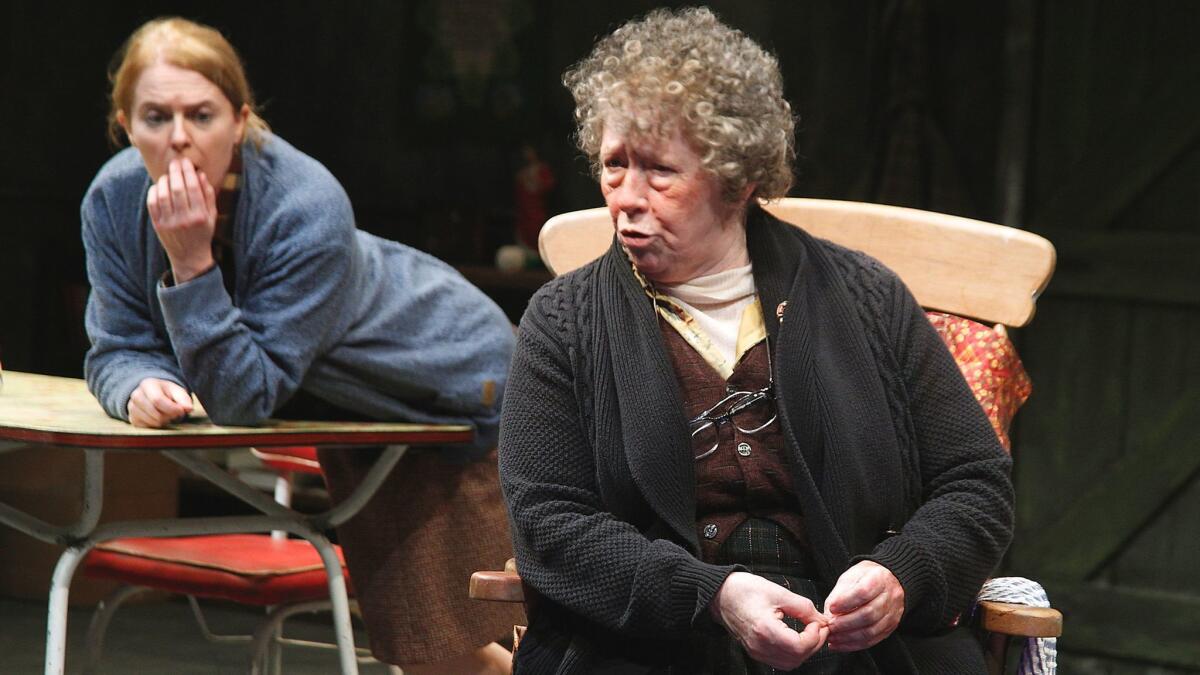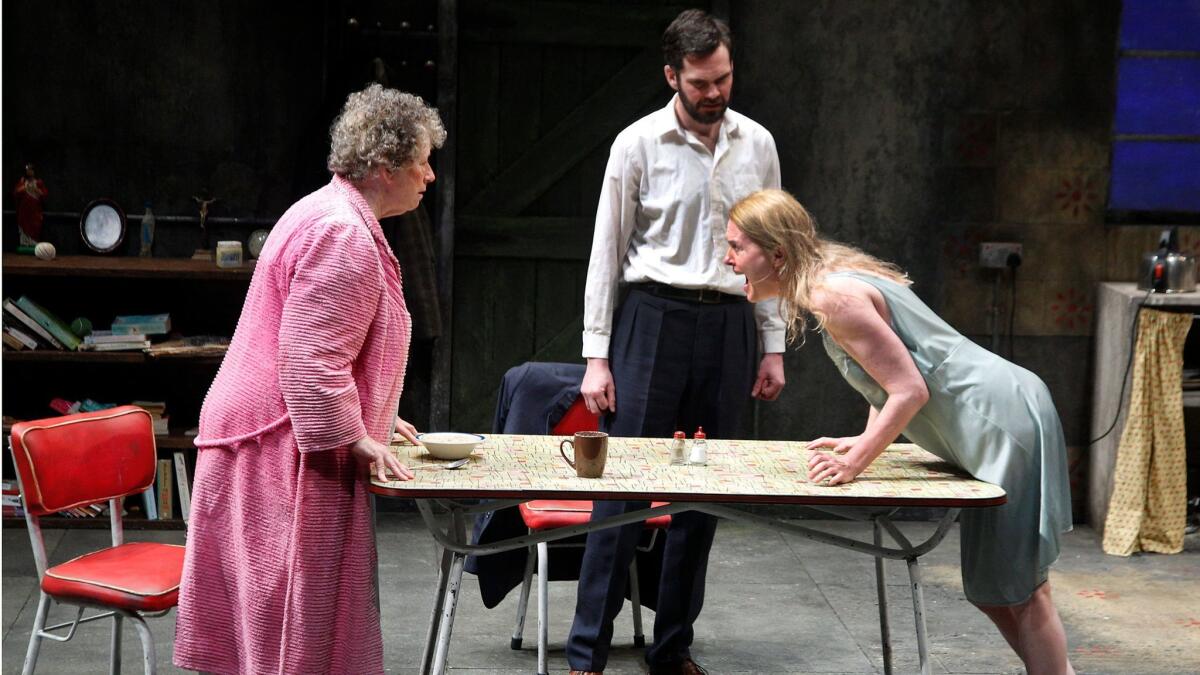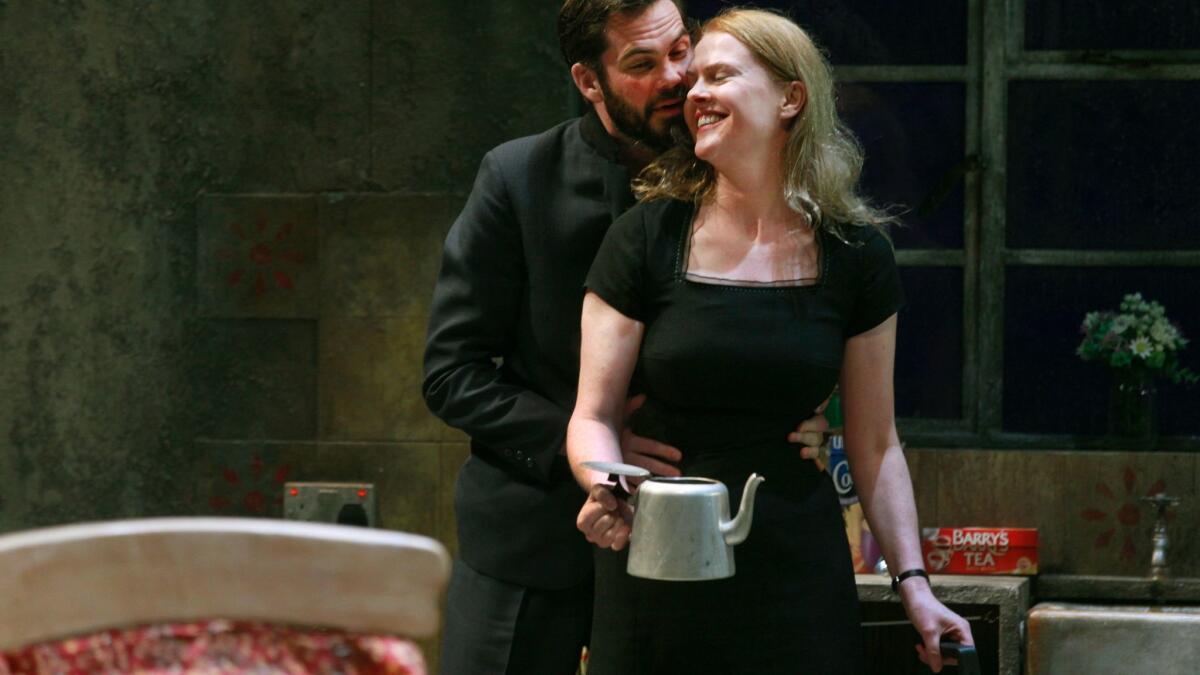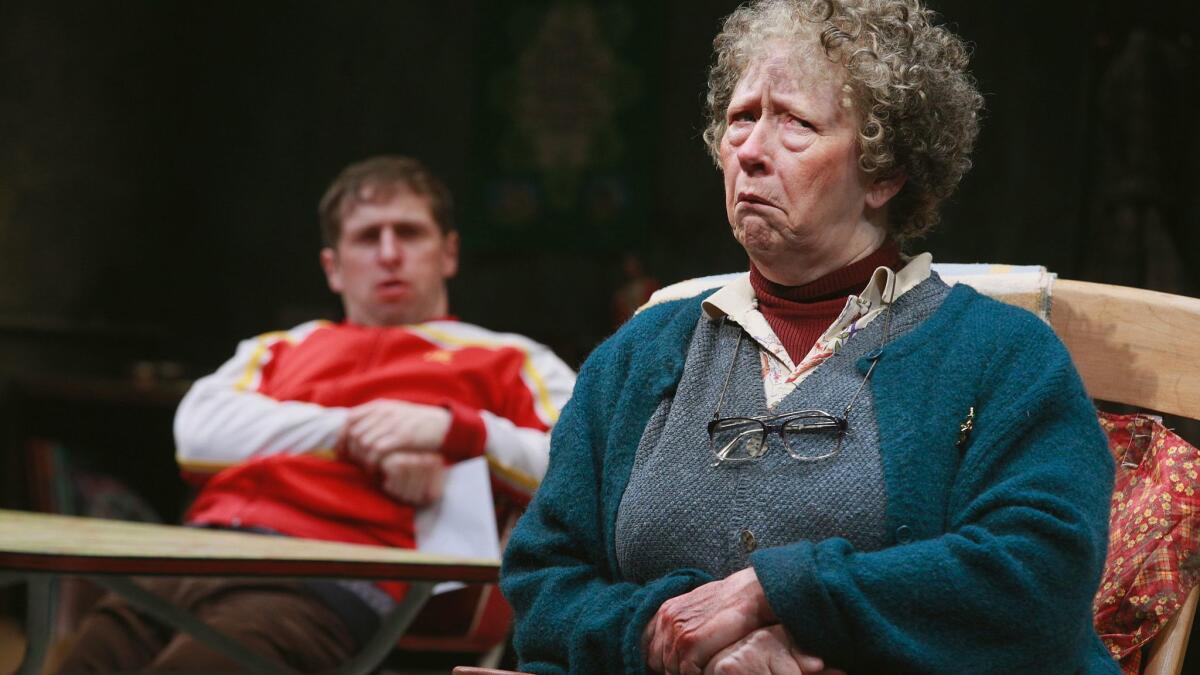Review: Mother vs. daughter in the emotional showdown of ‘Beauty Queen of Leenane’

- Share via
Martin McDonagh, the British-born playwright of Irish heritage and humor, made a sensational debut in 1996 with “The Beauty Queen of Leenane,” his bruising comic melodrama that announced the arrival of a wicked dramatic stylist.
Blending Dion Boucicault’s old-fashioned plotting with Quentin Tarantino’s bloodthirsty humor and a soupçon of Harold Pinter menace, “Beauty Queen” won great fanfare for the way its author wrapped audiences on both sides of the Atlantic around his devious finger.
Garry Hynes, who directed the original Druid Theatre Company/Royal Court Theatre production in Galway, became the first woman to win a Tony Award for play direction with her 1998 staging. For the Druid 20th anniversary production of “Beauty Queen,” which opened Wednesday at the Mark Taper Forum, Hynes has returned with her brilliant accomplice, Marie Mullen, who originated the role of 40-year-old unmarried Maureen and is now playing Maureen’s miserable crone of a mother, Mag.
The scenic design by Francis O’Connor, who did the sets for the original production, establishes a fresh perspective for Hynes’ reinvestigation of this play about a mother and a daughter locked in a caretaking relationship that has them both seething with murderous resentment. The cottage where the two women live in Leenane, a small town set down in the rugged landscape of Connemara, evokes the vague impression of a primitive cave home.

SIGN UP for the free Essential Arts & Culture newsletter »
The domestic details are right — the kitchen sink cluttered with dirty cups and bowls, the solitary rocker positioned in front of a small TV that drones incomprehensibly, the turf-fueled range eager to devour whatever is poked inside its hellish maw. But the frame of the production is mythic. A panel of rain-lashed sky that changes hues without ever becoming bright hovers above the scene, reminding us that the turbulent atmosphere indoors matches the inclement weather outside.
I was curious to revisit “Beauty Queen” (the first play in the Leenane trilogy that includes “A Skull in Connemara” and “The Lonesome West”) because I was not among its ardent champions when it had its New York premiere at the Atlantic Theater Company in 1998. McDonagh has made me laugh and shudder in disturbing combination in such plays as “The Lieutenant of Inishmore” and “The Cripple of Inishmaan” (both presented by Center Theatre Group), but my admiration has been limited to the boldness of his playwriting technique. His artistic vision — the soul of his work, if you will — has struck me as tantalizingly empty. (The McDonagh drama I find most satisfying is the 2008 film he wrote and directed, “In Bruges,” the screen being a better fit in my view for his unfailingly clever, if ultimately shallow, criminal mischief.)
This production of “Beauty Queen,” the first stop in the Druid’s U.S. tour, hasn’t convinced me that I missed the boat the first time around. But not expecting to be intellectually or spiritually nourished, I relaxed into the dark pleasures of McDonagh’s imagination. The play reveals the author’s relative inexperience through creaky exposition and crude plotting, but it also flaunts his comic audacity and fearless iconoclasm. McDonagh re-creates traditional Irish family drama only to set it ablaze with a postmodern blowtorch.
INTERVIEW: “Beauty Queen” star Marie Mullen on playing both mother and daughter »
Mullen was the emotional center of the original production of “The Beauty Queen of Leenane.” Her Tony-winning portrayal of Maureen didn’t shrink from the horror of what this unhappy woman, enslaved to her selfishly domineering mother, is capable of. But her performance had the play vibrating with a lonely ache.
No surprise then that Mullen would find sneaky ways of humanizing Mag. After Mullen’s Mag wins one of her routine tug-of-war bouts with Aisling O’Sullivan’s Maureen, who only begrudgingly brings her mother her tea, biscuit or porridge, a triumphant delight washes across the old woman’s face. Her pettiness is childish, her feeble helplessness a cover for control. Mullen’s Mag is scarier for being a recognizably human monster.
The plot hinges on the romantic hopes Maureen has for Pato Dooley (an appealing if too slickly dressed Marty Rea), who spends the night with her in a scene in which the two characters try to relieve themselves momentarily of their isolating awkwardness. As Pato places his arms around Maureen, she seems at a loss as to what to do with the kettles she’s always juggling.

Servitude has made Maureen bitter — she knows her mother will never release her without a fight — but she hasn’t completely forgotten that she’s a woman. O’Sullivan’s Maureen isn’t easy to get close to — the feral glint in her eyes is enough to put anyone off — but it’s heartbreaking the way she unclenches like a balled fist with a few strokes of tenderness.
Rea’s Pato is especially touching in the scene that takes place the morning after the dalliance, when Maureen thinks he’s turned on her after her mother’s vicious interference and nothing he says can convince her otherwise. He’s basically a nice guy who has innocently wandered into a mother-daughter war zone.
Pato’s recitation of the letter he has written to Maureen after he has returned to London for work is theatrically challenging, but Rea handles the task with bashful aplomb. The subsequent scene, in which Pato’s young brother Ray (a squirrely Aaron Monaghan) is sent to personally deliver the missive to prevent it from falling into Mag’s hands, accentuates the melodrama to comic effect. But the suspenseful belaboring begins to feel like shtick.
The ending remains shocking even if you already know how the dramatic events play out. This is a credit to the canniness of McDonagh’s playwriting skill. “Beauty Queen” ruthlessly exposes the emotional desperation of family life — a desperation quietly compounded by grim economic reality — but its style is more persuasive than its meaning. Two decades later, the play still provides a jangly theatrical escape for those who don’t mind when a fable leaves them recoiling.

------------
‘The Beauty Queen of Leenane’
Where: Mark Taper Forum, 135 N. Grand Ave., L.A.
When: 8 p.m. Tuesdays-Fridays, 2:30 and 8 p.m. Saturdays, 1 and 6:30 p.m. Sundays. (Call for exceptions.) Ends Dec. 18.
Tickets: $25 to $85 (subject to change)
Information: (213) 628-2772 or www.centertheatregroup.org
Running time: 2 hours and 20 minutes, including intermission
Follow me @charlesmcnulty
ALSO
Broadway’s fall revivals: Why big stars can’t make up for a lack of artistic vision
Demian Bichir will star in groundbreaking ‘Zoot Suit’; 2-for-1 ticket sale Friday
The Silver Lake young(ish) professional, adrift in ‘Icebergs’ at the Geffen Playhouse
More to Read
The biggest entertainment stories
Get our big stories about Hollywood, film, television, music, arts, culture and more right in your inbox as soon as they publish.
You may occasionally receive promotional content from the Los Angeles Times.











